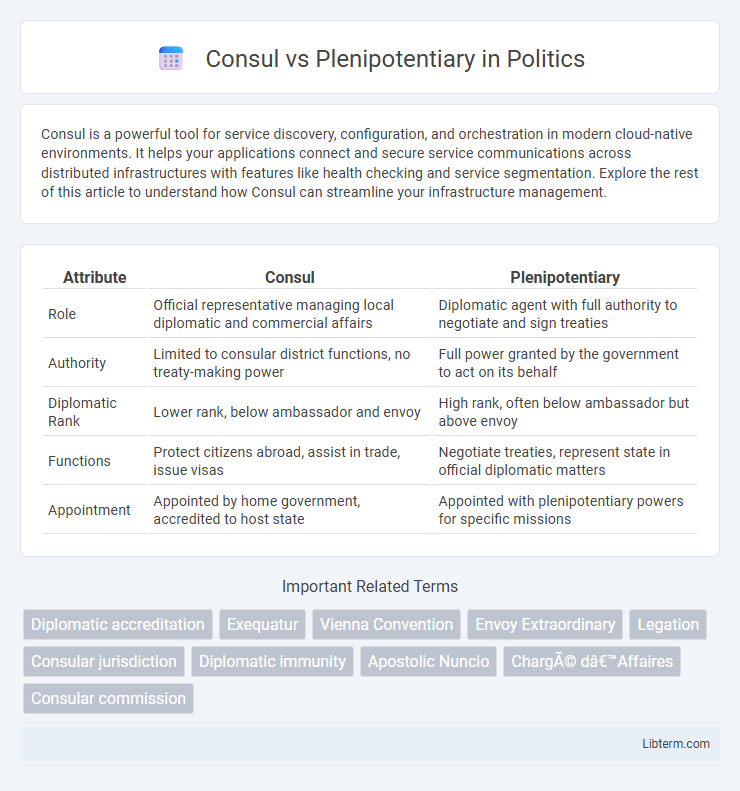Consul is a powerful tool for service discovery, configuration, and orchestration in modern cloud-native environments. It helps your applications connect and secure service communications across distributed infrastructures with features like health checking and service segmentation. Explore the rest of this article to understand how Consul can streamline your infrastructure management.
Table of Comparison
| Attribute | Consul | Plenipotentiary |
|---|---|---|
| Role | Official representative managing local diplomatic and commercial affairs | Diplomatic agent with full authority to negotiate and sign treaties |
| Authority | Limited to consular district functions, no treaty-making power | Full power granted by the government to act on its behalf |
| Diplomatic Rank | Lower rank, below ambassador and envoy | High rank, often below ambassador but above envoy |
| Functions | Protect citizens abroad, assist in trade, issue visas | Negotiate treaties, represent state in official diplomatic matters |
| Appointment | Appointed by home government, accredited to host state | Appointed with plenipotentiary powers for specific missions |
Introduction: Defining Consul and Plenipotentiary
A consul is an official appointed by a government to live in a foreign city and protect the citizens and interests of their home country, often handling administrative tasks like visas and trade relations. A plenipotentiary is a diplomat granted full authority to represent their government and make binding decisions on its behalf, typically in negotiations or treaties. The key distinction lies in the scope of power, where consuls primarily provide consular services, while plenipotentiaries possess comprehensive diplomatic powers.
Historical Origins and Evolution
Consuls originated in ancient Rome as elected officials representing the Republic, tasked with military command and civil administration, evolving into modern diplomatic agents protecting citizens and trade interests abroad. Plenipotentiaries emerged during the Renaissance and early modern period, empowered with full authority to negotiate and sign treaties on behalf of sovereigns, reflecting the consolidation of state diplomacy and international law. Over time, consuls specialized in consular services and citizen protection, whereas plenipotentiaries became synonymous with envoys holding extraordinary negotiating power in diplomatic missions.
Core Functions and Duties
Consuls primarily manage commercial interests, assist nationals abroad, and issue visas, ensuring the protection of their country's citizens and fostering trade relations. Plenipotentiaries hold full authority to negotiate and sign treaties on behalf of their government, often representing sovereign powers in diplomatic affairs. While consuls focus on administrative support and citizen services, plenipotentiaries handle high-level diplomatic negotiations and decision-making.
Legal Status and International Recognition
Consuls hold a limited legal status primarily focused on protecting their nation's interests and citizens within a host country, with recognition based on consular conventions under the Vienna Convention on Consular Relations. Plenipotentiaries possess broader legal authority, often empowered to negotiate and sign treaties on behalf of their government, enjoying full diplomatic immunity and recognition under the Vienna Convention on Diplomatic Relations. The international recognition of plenipotentiaries grants them a status equivalent to ambassadors, whereas consuls operate with a more restricted scope and legal capacity.
Authority and Decision-Making Powers
Consuls primarily handle administrative duties such as protecting their nation's citizens and promoting trade, operating under limited authority without the power to make binding diplomatic decisions. Plenipotentiaries possess full authority to negotiate and sign treaties on behalf of their government, often serving as ambassadors with comprehensive decision-making powers. The key distinction lies in the plenipotentiary's ability to act independently in diplomatic matters versus the consul's more restricted, service-oriented role.
Diplomatic Immunities and Privileges
Diplomatic immunities and privileges distinguish consuls and plenipotentiaries by their respective functions and legal protections under the Vienna Conventions. Consuls enjoy limited immunities primarily related to their official acts and consular premises, whereas plenipotentiaries, as accredited diplomatic agents with full powers, benefit from extensive immunities including inviolability of their person, immunity from jurisdiction, and exemption from most taxes and customs duties. These differences reflect their distinct roles: consuls manage local consular services with constrained protections, while plenipotentiaries represent their state at the highest diplomatic level with comprehensive legal safeguards.
Appointment and Accreditation Processes
Consul appointments are typically made by a country's foreign ministry and accredited to specific consular districts within a host nation, where they handle administrative and citizen services. Plenipotentiary diplomats, such as ambassadors, receive formal appointments by the head of state and present credentials directly to the host country's head of state, granting them full authority to represent their nation. The accreditation process for plenipotentiaries involves a formal credential exchange, whereas consuls are accredited through the foreign ministry without requiring head-of-state approval.
Areas of Operation and Jurisdiction
Consuls operate primarily in foreign cities within the host country, focusing on assisting citizens, issuing visas, and promoting trade and cultural relations, while their jurisdiction is limited to a specific consular district. Plenipotentiaries hold full authority to represent their government in diplomatic negotiations and treaties, typically functioning at an embassy or diplomatic mission with broader jurisdiction covering the entire host country or international matters. The consul's role is administrative and local, whereas the plenipotentiary exercises comprehensive diplomatic powers on behalf of their government.
Impact on International Relations
Consuls facilitate international trade and protect the interests of their citizens abroad, enhancing diplomatic communication on a practical level. Plenipotentiaries hold full authority to negotiate and sign treaties, directly shaping diplomatic agreements and state relationships. The distinction impacts how states conduct diplomacy, with plenipotentiaries influencing formal international policy and consuls managing ongoing bilateral cooperation.
Comparative Analysis: Consul vs Plenipotentiary
A consul primarily manages trade, protects the interests of their country's citizens abroad, and handles administrative duties in a foreign city. A plenipotentiary holds full authority to represent and negotiate on behalf of their government in diplomatic matters, often empowered to sign treaties. While consuls focus on consular services and economic relations, plenipotentiaries are high-ranking envoys entrusted with comprehensive diplomatic powers.
Consul Infographic

 libterm.com
libterm.com